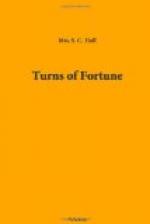“And is it not very shocking that in England a crust of bread should be a superfluity,” inquired Mabel.
“Very, dear; but a shilling was a great deal to give at the gate,” observed her aunt, adding, after a pause, “and yet it shows how little will make the poor happy. I am sure, if my father had looked abroad, instead of staying at home to watch his—his—money, he would have thought it right to share what he had. It is an unnatural thing to shut one’s self up from the duties of life; one gets no interest for any other outlay to do the heart service; but though those poor children danced their rags in the sunshine, and felt not the stones they danced on, yet my dear Mabel could not dance with poverty as her companion—my blessed, blessed child!”
“I’d rather dance a jig with mirth than a minuet with melancholy,” laughed the girl; “and yet it would take a great deal to make me miserable if I were with you, and you loved me, my dear aunt. Still, I own I like to be rich, so as to have everything I want, and give everybody what they want; and, aunt Sarah, you know very well I cannot finish this rose without the pale floss silk, and my maid forgot both that and to order the seed pearl.”
Mabel’s complaint was interrupted by the entrance of the servant, who told Miss Bond that Mr. Cramp, her attorney, wished to see her.
“Show him in,” said Miss Bond.
“He wishes to see you alone, ma’am.”
“His wife is going to die, and he will want you to marry him!” exclaimed Mabel, heedless of the servant’s presence. “Do, dear aunt, and let me be bride’s-maid.”
Sarah Bond changed colour; and then, while stooping to kiss her wayward niece, she called her “a foolish child.”
CHAPTER III.
Mr. Cramp, whom we introduced at the conclusion of the last chapter, as Miss Bond’s man of business, was a plain little man, skilled in the turnings and windings of the law, beside which he could not be said to know distinctly any other code of morals.
On this particular morning, after a few common-place observations, Mr. Cramp made a somewhat strange inquiry. “Had Miss Bond heard that Mr. Alfred Bond had come over to England?” No; she had not heard it. It was, Mr. Cramp insinuated (for he never said anything directly)—it was rather an awkward circumstance Mr. Alfred Bond’s coming to England. He thought—he believed—he hoped it would make no difference to Miss Bond.
Miss Bond opened her wide eyes still more widely. She knew that Mr. Alfred Bond was the heir-at-law to the property bequeathed her father; but what of that? he had never, that she heard of, dreamed of disputing the will; and she had never felt one pang of insecurity as to the possessions which had of late grown so deeply into her heart. At this unexpected intimation she felt the blood rush through her veins in a wild untameable manner. In all her trials—and they had been many—in all her illnesses—not a few—she had never fainted, never fallen into that symptom of weak-mindedness, a fit of hysterics; but now she sat without power of speech, looking at Mr. Cramp’s round face.




